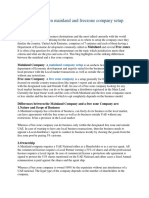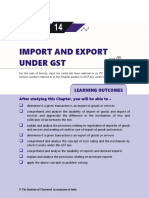0 ratings0% found this document useful (0 votes)
107 viewsOPC - One Person Company
OPC - One Person Company
Uploaded by
shwetaOne Person Company (OPC) is a new corporate structure introduced by the Companies Act, 2013 that allows a sole proprietor to take advantage of the benefits of incorporation while maintaining a single ownership structure. Key features of an OPC include having only one shareholder who can also act as the sole director, nomination of another person as shareholder in case of the original shareholder's incapacity, and relaxed compliance requirements compared to private companies. OPCs provide benefits like separate legal status, limited liability, easier financing, and tax benefits, making them an attractive option for small businesses and entrepreneurs.
Copyright:
© All Rights Reserved
Available Formats
Download as PDF, TXT or read online from Scribd
OPC - One Person Company
OPC - One Person Company
Uploaded by
shweta0 ratings0% found this document useful (0 votes)
107 views18 pagesOne Person Company (OPC) is a new corporate structure introduced by the Companies Act, 2013 that allows a sole proprietor to take advantage of the benefits of incorporation while maintaining a single ownership structure. Key features of an OPC include having only one shareholder who can also act as the sole director, nomination of another person as shareholder in case of the original shareholder's incapacity, and relaxed compliance requirements compared to private companies. OPCs provide benefits like separate legal status, limited liability, easier financing, and tax benefits, making them an attractive option for small businesses and entrepreneurs.
Original Title
OPC- one person company
Copyright
© © All Rights Reserved
Available Formats
PDF, TXT or read online from Scribd
Share this document
Did you find this document useful?
Is this content inappropriate?
One Person Company (OPC) is a new corporate structure introduced by the Companies Act, 2013 that allows a sole proprietor to take advantage of the benefits of incorporation while maintaining a single ownership structure. Key features of an OPC include having only one shareholder who can also act as the sole director, nomination of another person as shareholder in case of the original shareholder's incapacity, and relaxed compliance requirements compared to private companies. OPCs provide benefits like separate legal status, limited liability, easier financing, and tax benefits, making them an attractive option for small businesses and entrepreneurs.
Copyright:
© All Rights Reserved
Available Formats
Download as PDF, TXT or read online from Scribd
Download as pdf or txt
0 ratings0% found this document useful (0 votes)
107 views18 pagesOPC - One Person Company
OPC - One Person Company
Uploaded by
shwetaOne Person Company (OPC) is a new corporate structure introduced by the Companies Act, 2013 that allows a sole proprietor to take advantage of the benefits of incorporation while maintaining a single ownership structure. Key features of an OPC include having only one shareholder who can also act as the sole director, nomination of another person as shareholder in case of the original shareholder's incapacity, and relaxed compliance requirements compared to private companies. OPCs provide benefits like separate legal status, limited liability, easier financing, and tax benefits, making them an attractive option for small businesses and entrepreneurs.
Copyright:
© All Rights Reserved
Available Formats
Download as PDF, TXT or read online from Scribd
Download as pdf or txt
You are on page 1of 18
Name: Shweta Subhash Gawde.
Sub: Business law-III
Std: SYBAF-B (SEM-4)
Roll no: 20071
TOPIC: ONE PERSON COMPANY
What is One Person Company ?
• The concept of One Person Company [OPC] is a new vehicle/form of
business, introduced by The Companies Act, 2013 [No.18 of 2013], thereby
enabling Entrepreneur(s) carrying on the business in the Sole-Proprietor form
of business to enter into a Corporate Framework.
• One Person Company is a hybrid of Sole-Proprietor and Company form of
business, and has been provided with concessional/relaxed requirements
under the Act.
Features of One Person Company
1. Only One Shareholder
2. Nominee for the Shareholder
3. Director
1. Only One Shareholder
• Only a natural person, who is an Indian citizen and resident in India shall be
eligible to incorporate a One Person Company.
• Explanation: The term "Resident in India" means a person who has stayed in
India for a period of not less than 182 days during the immediately preceding
one calendar year.
2. Nominee for the Shareholder
• The Shareholder shall nominate another person who shall become the
shareholders in case of death/incapacity of the original shareholder.
• Such nominee shall give his/her consent and such consent for being
appointed as the Nominee for the sole Shareholder.
• Only a natural person, who is an Indian citizen and resident in India shall be a
nominee for the sole member of a One Person Company.
3. Director
• Must have a minimum of One Director, the Sole Shareholder can himself be
the Sole Director. The Company may have a maximum number of 15 directors.
Terms and Restrictions of OPC
1. A person shall not be eligible to incorporate more than a One Person
Company or become nominee in more than one such company.
2. Minor cannot shall become member or nominee of the One Person
Company or can hold share with beneficial interest.
3. An OPC cannot be incorporated or converted into a company under Section
8 of the Act. [Company not for Profit].
4. An OPC cannot carry out Non-Banking Financial Investment activities
including investment in securities of any body corporate.
5. An OPC cannot convert voluntarily into any kind of company unless two
years have expired from the date of incorporation of One Person Company,
except threshold limit (paid up share capital) is increased beyond Rs.50 Lakhs
or its average annual turnover during the relevant period exceeds Rs.2 Crores
i.e., if the Paid-up capital of the Company crosses Rs.50 Lakhs or the average
annual turnover during the relevant period exceeds Rs.2 Crores, then the OPC
has to invariably file forms with the ROC for conversion in to a Private or Public
Company, with in a period of Six Months on breaching the above threshold
limits.
Steps to incorporate OPC
1. Obtain Digital Signature Certificate [DSC] for the proposed Director(s).
2. Obtain Director Identification Number [DIN] for the proposed director(s).
3. Select suitable Company Name, and make an application to the Ministry of
Corporate Office for availability of name.
4. Draft Memorandum of Association and Articles of Association [MOA &
AOA]. Steps to Incorporate One Person Company (OPC)
5. Sign and file various documents including MOA & AOA with the Registrar of
Companies electronically.
6. Payment of Requisite fee to Ministry of Corporate Affairs and also Stamp
Duty.
7. Scrutiny of documents at Registrar of Companies [ROC].
8. Receipt of Certificate of Registration/Incorporation from ROC.
Advantages of OPC
1. A Separate Legal Entity : One Person company is a separate legal entity and
capable of doing everything that an entrepreneur would do.
2. Easy Funding : Like a Private company, One Person Company can raise funds
through venture capital, financial institutions, angel investors etc. A One
Person Company can raise funds thus graduating itself to a private limited
company.
3. More Opportunities, Limited Liability : Since the liability of the One Person
Company is limited to the extent of the value of the share you hold, the
individual could take more risk in business without affecting or suffering loss of
personal assets. It is the encouragement to new, young and innovative
start-ups.
4. Minimum Compliances : One Person Company have to face little compliance
burden as compared to private limited companies , hence One Person
Company can more focus on other functional and core areas.
5. Credit Rating : The One Person company with bad credit rating may even get
the loan. Credit rating of One person company will not be material if the rating
of One person company is as per norms.
6. Benefits under Income Tax Law : Any remuneration paid to the director will
be allowed as deduction as per income tax law unlike proprietorship. Other
benefits of presumptive taxation are also available subject to income tax act.
7. Benefits of being a Small Scale Industries : An One Person Company can avail
the various benefits provided to Small Scale Industries like lower rate of
Interest on loans, easy funding from bank without depositing any security to a
certain limit, manifold benefits under Foreign Trade policy and others. All these
benefits can be boon to any business in initial years.
8. The Only Owner : You, only the owner helpful in quick decision-making,
controlling and managing the business without following any elongated
processes and methodologies as adopted in other companies. The sense of
belonging inspires to grow the business further.
9. Receive Interest on any late Payment : One Person company avails all the
benefits under Enterprises development Act, 2006. The newly start-up One
Person company is micro, small, or medium, hence they are covered under this
act . As per the Act, if buyer or receiver receives any late payment (receives
payment after specified period) , then he is entitled to receive interest which is
three times the bank rate.
10. Increased Trust and Prestige : Any business entity that runs in the form of
company always enjoys an increased trust and prestige.
Partnership Firm V/S OPC
● Registration is mandatory ● Registration is not mandatory
● Minimum 2 persons required ● Only one person required
● Maximum 10 or 20 ● Maximum 3 (2nd: nominee)
● Joint owner ● Single owner
● Registration is not compulsory ● Registration is compulsory
● Ownership is not Transferrable ● Ownership is transferable
● Partne and firm both are same ● Owner and company both are
different
Conclusion
The concept of OPC is still in its nascent stages in India and would require
some more time to mature and to be fully accepted by the business world.
With passage of time, the OPC mode of business organization is all set to
become the most preferred form of business organization specially for small
entrepreneurs.
The One Person Company concept holds a bright future for small traders,
entrepreneurs with low risk taking capacity, artisans and other service
providers.
An OPC as a business structure doesn’t seem efficient from tax perspective as
an OPC would be treated as a company and be subject to a higher rate of tax
compared to a Sole Proprietorship. Since an OPC is a company, there would
be an incidence of tax (dividend distribution tax) while distribution of
dividend.
Thank you..!
You might also like
- Appeal - Service TaxDocument22 pagesAppeal - Service TaxektaNo ratings yet
- Self-Declaration Format V3Document1 pageSelf-Declaration Format V3fruitsplusgeneralstoreNo ratings yet
- IndiaFilings BrochureDocument11 pagesIndiaFilings BrochureAjit Sinha50% (2)
- LLP Agreement Altered India1Document19 pagesLLP Agreement Altered India1Ram IyerNo ratings yet
- Registration of Partnership Firm in MaharashtraDocument4 pagesRegistration of Partnership Firm in MaharashtraAdv. Govind S. TehareNo ratings yet
- Takeover and Insider Trading Regulations: Project Report ONDocument42 pagesTakeover and Insider Trading Regulations: Project Report ONRishika JhawarNo ratings yet
- Conversion of Public Company Into Private Limited Company - 20.12.2018Document10 pagesConversion of Public Company Into Private Limited Company - 20.12.2018Divesh GoyalNo ratings yet
- SITHCCC008 Assessment 1 - PortfolioDocument18 pagesSITHCCC008 Assessment 1 - Portfolioajay64% (14)
- Start Up Start Company: Start Business in IndiaDocument13 pagesStart Up Start Company: Start Business in IndiaNishok NagamaniNo ratings yet
- About Composition Scheme in GSTDocument3 pagesAbout Composition Scheme in GSTArpit GuptaNo ratings yet
- Presention On: One Person Company (OPC)Document18 pagesPresention On: One Person Company (OPC)Prience 1213No ratings yet
- D V Services AGENCY PROFILE For BEST CAPITAL SERVICES LTDDocument4 pagesD V Services AGENCY PROFILE For BEST CAPITAL SERVICES LTDhp agencyNo ratings yet
- IPO ProcessDocument27 pagesIPO ProcessCA VK AsawaNo ratings yet
- The Companies Act, 2013 Company Limited by Shares Memorandum of Association OF XYZ Private Limited (OPC)Document9 pagesThe Companies Act, 2013 Company Limited by Shares Memorandum of Association OF XYZ Private Limited (OPC)DhanvanthNo ratings yet
- Alteration of Memorandum of Association (MOA) (Company Update)Document12 pagesAlteration of Memorandum of Association (MOA) (Company Update)Shyam Sunder0% (1)
- Resume - Shantanu - Semi Qualified - KanpurDocument5 pagesResume - Shantanu - Semi Qualified - KanpurAnuj GoyalNo ratings yet
- Private Limited CompanyDocument2 pagesPrivate Limited CompanyAiman FatimaNo ratings yet
- Waterfall MechanismDocument7 pagesWaterfall MechanismAishwarya AdlakhaNo ratings yet
- Companies Act 2013: - Heli ShahDocument42 pagesCompanies Act 2013: - Heli ShahHELI SHAHNo ratings yet
- GST Registration in IndiaDocument24 pagesGST Registration in IndiaVijai AnandNo ratings yet
- Difference Between Mainland and Freezone Company SetupDocument2 pagesDifference Between Mainland and Freezone Company SetupShiva kumarNo ratings yet
- Foreign Company To Run Business in IndiaDocument3 pagesForeign Company To Run Business in Indiagaurav singhNo ratings yet
- Incorporation MoA AoADocument26 pagesIncorporation MoA AoAFarhanNo ratings yet
- MOA and AOADocument37 pagesMOA and AOARudraThakurNo ratings yet
- Indian Business LawDocument335 pagesIndian Business Lawmanishkul-No ratings yet
- ONGC Tender TemplateDocument88 pagesONGC Tender TemplateHitesh NayyarNo ratings yet
- Faq SastDocument94 pagesFaq SastAniket SojitraNo ratings yet
- Demystifying The Insolvency and Bankruptcy CodeDocument27 pagesDemystifying The Insolvency and Bankruptcy CodemickeyNo ratings yet
- LEVY AND COLLECTION OF GST - AbhiDocument14 pagesLEVY AND COLLECTION OF GST - AbhiAbhishek Abhi100% (1)
- Insolvency and Bankruptcy CODE 2016 Regulatory Framework For Distressed M&As Under IBC 2016Document60 pagesInsolvency and Bankruptcy CODE 2016 Regulatory Framework For Distressed M&As Under IBC 2016IIM RohtakNo ratings yet
- GST Drona Material PDFDocument124 pagesGST Drona Material PDFAruna RajappaNo ratings yet
- Recent Income Tax Case LawsDocument65 pagesRecent Income Tax Case LawsMADHAVNo ratings yet
- GST Registration PDFDocument73 pagesGST Registration PDFshakshi guptaNo ratings yet
- Ca Audit PDFDocument154 pagesCa Audit PDFsandesh1506No ratings yet
- Ch-23 Conversion To LLPDocument9 pagesCh-23 Conversion To LLPShubham PatelsNo ratings yet
- Form CHG-1-16032017 Signe Cfil CDocument6 pagesForm CHG-1-16032017 Signe Cfil CsunjuNo ratings yet
- E-Filing Income Tax Returns: Dr. Kailash KalyaniDocument41 pagesE-Filing Income Tax Returns: Dr. Kailash KalyaniRicha KalyaniNo ratings yet
- Company Law PDFDocument13 pagesCompany Law PDFmanish kumarNo ratings yet
- 10.10 As 24 Discontinuing OperationsDocument4 pages10.10 As 24 Discontinuing OperationsAnakin SkywalkerNo ratings yet
- Taxguru - In-Guide To Approved Gratuity FundDocument12 pagesTaxguru - In-Guide To Approved Gratuity FundnanuNo ratings yet
- Form 9 - Consent of DP and Subscriber SheetDocument5 pagesForm 9 - Consent of DP and Subscriber SheetCyber VirginNo ratings yet
- Form - SH-1 - Share CertificateDocument1 pageForm - SH-1 - Share CertificateSauravNo ratings yet
- Moa & AoaDocument14 pagesMoa & Aoahina ranaNo ratings yet
- What Is A Joint Venture?Document8 pagesWhat Is A Joint Venture?Ronak GalaNo ratings yet
- 08 - PGBPDocument42 pages08 - PGBPMujtaba ZaidiNo ratings yet
- MOUDocument7 pagesMOUMukesh SainiNo ratings yet
- Mergers and Amalgamations-The Concepts: Chapter-IvDocument44 pagesMergers and Amalgamations-The Concepts: Chapter-IvDilwar HussainNo ratings yet
- FemaDocument25 pagesFemaSKSAIDINESHNo ratings yet
- Receipt of Demand Notice Under Section 156 of The Income Tax Act, 1961 (Company Update)Document1 pageReceipt of Demand Notice Under Section 156 of The Income Tax Act, 1961 (Company Update)Shyam SunderNo ratings yet
- Tax ProjectDocument40 pagesTax ProjectGunaNo ratings yet
- Block Credit Under GSTDocument2 pagesBlock Credit Under GSTparam.ginni100% (1)
- Import and Export Under GSTDocument50 pagesImport and Export Under GSTSONICK THUKKANINo ratings yet
- LAW MCQ DArshan KhareDocument162 pagesLAW MCQ DArshan KhareGopi NaiduNo ratings yet
- Natural Justice will prevail प्राकृतिक न्याय रहेगा - Naresh KadyanDocument70 pagesNatural Justice will prevail प्राकृतिक न्याय रहेगा - Naresh KadyanNaresh KadyanNo ratings yet
- Sec 7A EPF Act-FinalDocument72 pagesSec 7A EPF Act-FinalMANOJ PANDEYNo ratings yet
- FEMA Compliance and Recent Policies On FDI - CA Manoj ShahDocument58 pagesFEMA Compliance and Recent Policies On FDI - CA Manoj ShahAbhinay KumarNo ratings yet
- Analysis On Asset Reconstruction Companies - Making Good Misuse of The LawDocument5 pagesAnalysis On Asset Reconstruction Companies - Making Good Misuse of The LawAASHISH GUPTANo ratings yet
- Cross Boader Merger & AcquisitionDocument9 pagesCross Boader Merger & AcquisitionsangeetagoeleNo ratings yet
- Topic:-Memorandum of Association & Articles of Association: IndexDocument11 pagesTopic:-Memorandum of Association & Articles of Association: IndexBrajesh SinghNo ratings yet
- GST Tally ERP9 English: A Handbook for Understanding GST Implementation in TallyFrom EverandGST Tally ERP9 English: A Handbook for Understanding GST Implementation in TallyRating: 5 out of 5 stars5/5 (1)
- Investigation into the Adherence to Corporate Governance in Zimbabwe’s SME SectorFrom EverandInvestigation into the Adherence to Corporate Governance in Zimbabwe’s SME SectorNo ratings yet
- Project Raspberrypi WebServerDocument6 pagesProject Raspberrypi WebServeragung indotechNo ratings yet
- MX3G PLC HMI All in One Programming Manual-1Document22 pagesMX3G PLC HMI All in One Programming Manual-1adaoNo ratings yet
- Intradermal Administration PRDocument2 pagesIntradermal Administration PRLady DanielleNo ratings yet
- Control Systems (CS)Document30 pagesControl Systems (CS)Shwetank AryanNo ratings yet
- 2017 SC Cases-Political LawDocument86 pages2017 SC Cases-Political LawMatthew Witt100% (1)
- Ash'Sharqiyah Sands Water Supply SchemeDocument19 pagesAsh'Sharqiyah Sands Water Supply SchemekerdiziyedNo ratings yet
- DTC P0500 Vehicle Speed Sensor "A": Circuit DescriptionDocument4 pagesDTC P0500 Vehicle Speed Sensor "A": Circuit Descriptionjeremih alhegnNo ratings yet
- JVC Car KD-R416Document62 pagesJVC Car KD-R416Rosaline HoskinsNo ratings yet
- Saurabh RESUME DOT NET DEVELOPERDocument2 pagesSaurabh RESUME DOT NET DEVELOPERsaurabhsambhe7No ratings yet
- Course Promotional 3Document15 pagesCourse Promotional 3Alexander Klain AquiatanNo ratings yet
- Artigog 2Document11 pagesArtigog 2Felipi ZzzNo ratings yet
- DynamicsAX2012 ImplementationPlanningGuideDocument171 pagesDynamicsAX2012 ImplementationPlanningGuideAlan PompilhoNo ratings yet
- AwardDocument19 pagesAwardYazur GargNo ratings yet
- Solomon Corporation Acquires South Dakota Transformer Repair Facility From A-LineDocument2 pagesSolomon Corporation Acquires South Dakota Transformer Repair Facility From A-LinePR.comNo ratings yet
- Upward Leadership - LassiterDocument2 pagesUpward Leadership - Lassiterdreea_mNo ratings yet
- Musir Alam Khan (CV) - 1Document5 pagesMusir Alam Khan (CV) - 1Srujana MNo ratings yet
- Apache Server On Windows 7 Opening Up Ports?: 7 AnswersDocument3 pagesApache Server On Windows 7 Opening Up Ports?: 7 Answersbluebird1969No ratings yet
- Public-Private Partnership (P3) Guidelines: Texas Department of TransportationDocument55 pagesPublic-Private Partnership (P3) Guidelines: Texas Department of TransportationKunqi ZhangNo ratings yet
- Module 11 BAEN 1 Principles of Accounting BSBADocument11 pagesModule 11 BAEN 1 Principles of Accounting BSBApatricia.eubans28No ratings yet
- Hempel's GalvosilDocument13 pagesHempel's GalvosilanhnxNo ratings yet
- Classified Advertising: Manager - CivilDocument2 pagesClassified Advertising: Manager - Civilcogobib194No ratings yet
- R.a.10396 Conciliation MediationDocument2 pagesR.a.10396 Conciliation Mediationzarah guia bunyiNo ratings yet
- 74HC373Document13 pages74HC373jnax101No ratings yet
- Class x Science Exampler Solution Chapter 10 – Light Reflection and RefractionDocument49 pagesClass x Science Exampler Solution Chapter 10 – Light Reflection and RefractionarulrajasivamNo ratings yet
- AC DC Railway Electrification and Protection: November 2014Document43 pagesAC DC Railway Electrification and Protection: November 2014Akhilesh kumar Srivastava100% (1)
- Marketing Canvas 2.0 Brochuse (InnovatingSociety)Document15 pagesMarketing Canvas 2.0 Brochuse (InnovatingSociety)JMIFBNo ratings yet
- Farha ProjectDocument18 pagesFarha ProjectBhavya PabbisettyNo ratings yet
- My Paper Determinants of Customer LoyaltyDocument15 pagesMy Paper Determinants of Customer LoyaltyAye Sandar WinNo ratings yet
- Hungarian Dance No 5 in G Minor Sheet Music For Piano (Solo)Document1 pageHungarian Dance No 5 in G Minor Sheet Music For Piano (Solo)AdonayNo ratings yet

























































































